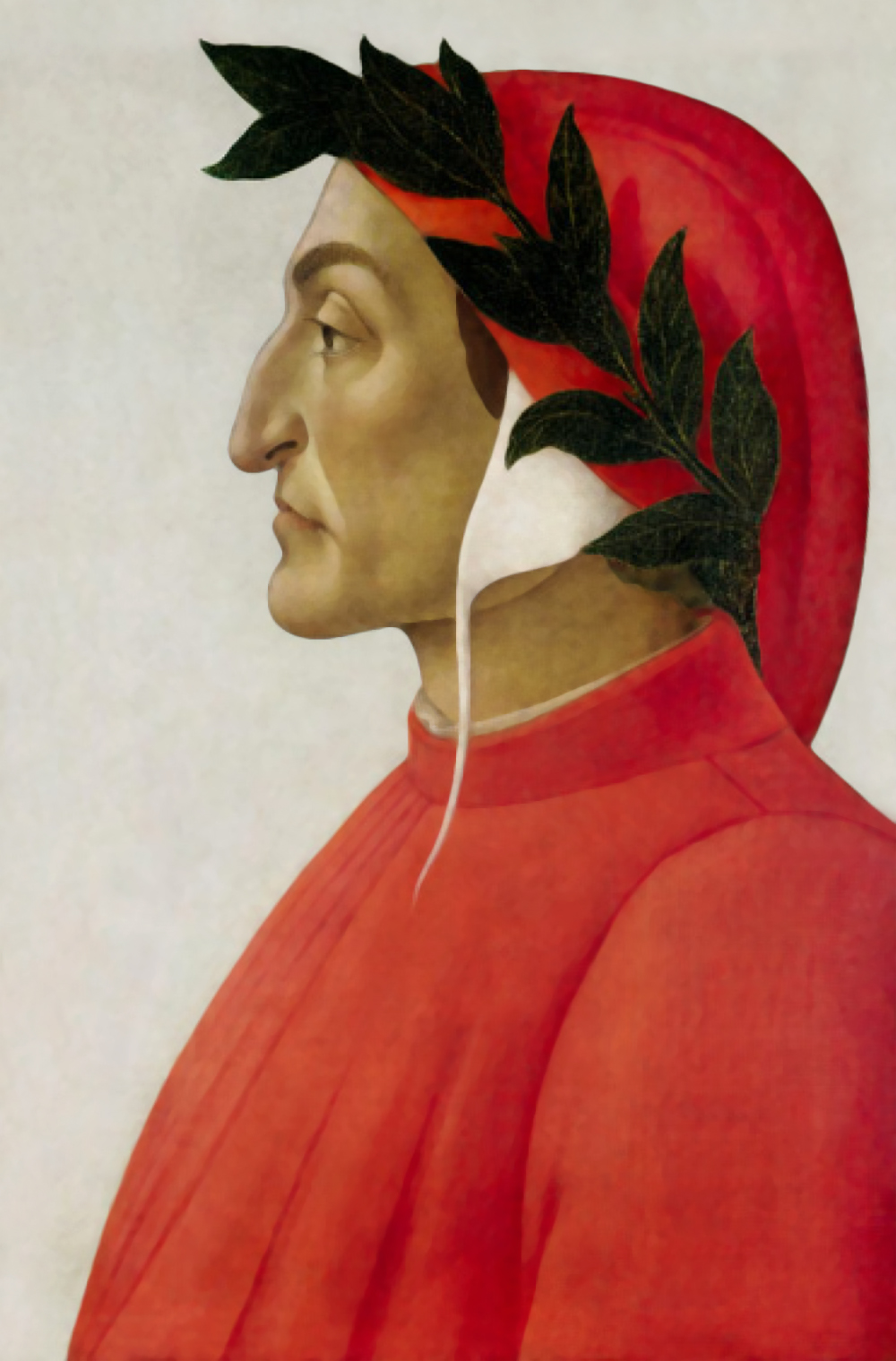Frases célebres de Dante Alighieri
La Divina Comedia
Fuente: Infierno, Canto XXVII, sentencia 118-120.
La Divina Comedia
Fuente: Paraíso, Canto V, sentencia 73-81.
La Divina Comedia
Fuente: Purgatorio, Canto XI, sentencia 115-117.
La Divina Comedia
Fuente: Infierno, Canto XXVI, sentencia 118-120.
Frases sobre el corazón de Dante Alighieri
“El vino siembra poesía en los corazones.”
Fuente: Citado en Alicia, Misrahi. En la cocina de Afrodita. Ediciones Robinbook, 2008. ISBN 978-84-7927-940-0. p. 63.
Dante Alighieri Frases y Citas
La Divina Comedia
Fuente: Paraíso, Canto V, sentencia 40-42.
“¡Oh gente humana, para volar nacida!
¿porqué al menor soplo caes vencida?”
La Divina Comedia
Fuente: Purgatorio, Canto XII, sentencia 95-96.
“Luz os es dada para bien y para malicia.”
La Divina Comedia
Fuente: Purgatorio, Canto XVI, sentencia 75.
La Divina Comedia
Fuente: Paraíso, Canto XIX, sentencia 79-81.
“La raza humana se encuentra en la mejor situación cuando posee el más alto grado de libertad.”
Fuente: Monarquía, libro I, capítulo XIV.
“Traducción: «He aquí (un) Dios, más fuerte que yo, que viniendo me dominará.»”
Ecce Deus fortior me, qui veniens dominabitur mihi
Vida Nueva
Fuente: Capítulo II.
“¿Quién es más perverso sino a quien
el divino juicio contrista?”
La Divina Comedia
Fuente: Infierno, Canto XX, sentencia 29-30.
La Divina Comedia
Fuente: Infierno, Canto XXVIII, sentencia 115-117.
“Libertad va buscando, que le es tan cara,
como lo sabe quien la vida por ella deja.”
La Divina Comedia
Fuente: Purgatorio, Canto I, sentencia 71-72.
La Divina Comedia
Fuente: Paraíso, Canto XVII, sentencia 58-60.
La Divina Comedia
Fuente: Paraíso, Canto XXII, sentencia 151-154.
“Hay un secreto para vivir feliz con la persona amada: no pretender modificarla.”
Fuente: Citado en Bol Cecilio; OLLIRUM LEUGIM. Mis conversaciones con ellos. Editor Bubok 2010. ISBN 978-84-90096-34-5. p. 98.
“Quien sabe de dolor, todo lo sabe.”
Fuente: Citado en Antología de pensamientos, apotegmas, proverbios, refranes, reflexiones, parábolas y axiomas de hombres célebres. Editorial Gisbert y Cía., 1988.
Vida Nueva
Fuente: Capítulo XXVI; Saludo a Beatriz.
Fuente: Divina Comedia - Infierno, canto III, sentencia 1-9
Alianza Editorial - Versión poética de Abilio Echeverría
Dante Alighieri: Frases en inglés
“It hither, thither, downward, upward, drives them.”
Canto V, line 43 (tr. Longfellow).
The Divine Comedy (c. 1308–1321), Inferno
Canto XI, lines 100–102 (tr. C. E. Norton).
The Divine Comedy (c. 1308–1321), Purgatorio
Canto XXV, lines 46–48 (tr. Longfellow).
The Divine Comedy (c. 1308–1321), Inferno
Canto XXX, lines 118–120 (tr. C. E. Norton).
The Divine Comedy (c. 1308–1321), Purgatorio
Canto VI, lines 43–46 (tr. Carlyle-Wicksteed).
The Divine Comedy (c. 1308–1321), Purgatorio
Fuente: La Vita Nuova (1293), Chapter I, opening lines (as reported in The 100 Best Love Poems of All Time by Leslie Pockell)
Canto I, lines 1–3 (tr. C. E. Norton).
The Divine Comedy (c. 1308–1321), Purgatorio
Canto XVII, lines 58–60 (tr. Sinclair).
The Divine Comedy (c. 1308–1321), Paradiso
Canto V, lines 28–30 (tr. Charles S. Singleton).
The Divine Comedy (c. 1308–1321), Inferno
Canto XX, lines 73–77 (tr. Sinclair).
The Divine Comedy (c. 1308–1321), Paradiso
“Pride, Envy, and Avarice are
the three sparks that have set these hearts on fire.”
Canto VI, lines 74–75 (tr. Sinclair).
The Divine Comedy (c. 1308–1321), Inferno
“Abandon all hope, you who enter here.”
Canto III, line 9.
Often quoted with the translated form "Abandon hope all ye who enter here". The word "all" modifies hope, not those who enter: "ogni speranza" means "all hope".
The Divine Comedy (c. 1308–1321), Inferno
Canto XIX, lines 79–81 (tr. Longfellow).
The Divine Comedy (c. 1308–1321), Paradiso
Canto III, lines 79–84 (tr. Longfellow).
The Divine Comedy (c. 1308–1321), Purgatorio
Canto III, lines 40–42 (tr. Mark Musa).
The Divine Comedy (c. 1308–1321), Inferno
ne le braccia avea
madonna involta in un drappo dormendo.
Poi la svegliava, e d'esto core ardendo
lei paventosa umilmente pascea:
appresso gir lo ne vedea piangendo.
Fuente: La Vita Nuova (1293), Chapter I, First Sonnet (tr. Mark Musa)
Canto XX, lines 136–138 (tr. Longfellow).
The Divine Comedy (c. 1308–1321), Paradiso
“The use of men is like a leaf
On bough, which goeth and another cometh.”
Canto XXVI, lines 137–138 (tr. Longfellow).
The Divine Comedy (c. 1308–1321), Paradiso
Canto V, lines 19–24 (tr. Singleton).
The Divine Comedy (c. 1308–1321), Paradiso
“Here one must leave behind all hesitation;
here every cowardice must meet its death.”
Canto III, lines 14–15 (tr. Mandelbaum).
The Divine Comedy (c. 1308–1321), Inferno
“A fair request should be followed by the deed in silence.”
Canto XXIV, lines 77–78 (tr. Sinclair).
The Divine Comedy (c. 1308–1321), Inferno
“Against a better will the will fights ill,…”
Canto XX, line 1 (tr. C. E. Norton).
The Divine Comedy (c. 1308–1321), Purgatorio
“From that point
Dependent is the heaven and nature all.”
Canto XXVIII, lines 41–42 (tr. Longfellow).
The Divine Comedy (c. 1308–1321), Paradiso
“Behold the grass, the flowerets, and the shrubs
Which of itself alone this land produces.”
Canto XXVII, lines 134–135 (tr. Longfellow).
The Divine Comedy (c. 1308–1321), Purgatorio
“And you, the living soul, you over there
get away from all these people who are dead.”
Canto III, lines 88–89 (tr. Mark Musa).
The Divine Comedy (c. 1308–1321), Inferno
“The night that hides things from us.”
Canto XXIII, line 3 (tr. Sinclair).
The Divine Comedy (c. 1308–1321), Paradiso
Canto III, lines 1–3 (tr. Mandelbaum).
The Divine Comedy (c. 1308–1321), Inferno
Canto I, lines 22–24 (tr. Longfellow).
The Divine Comedy (c. 1308–1321), Purgatorio
